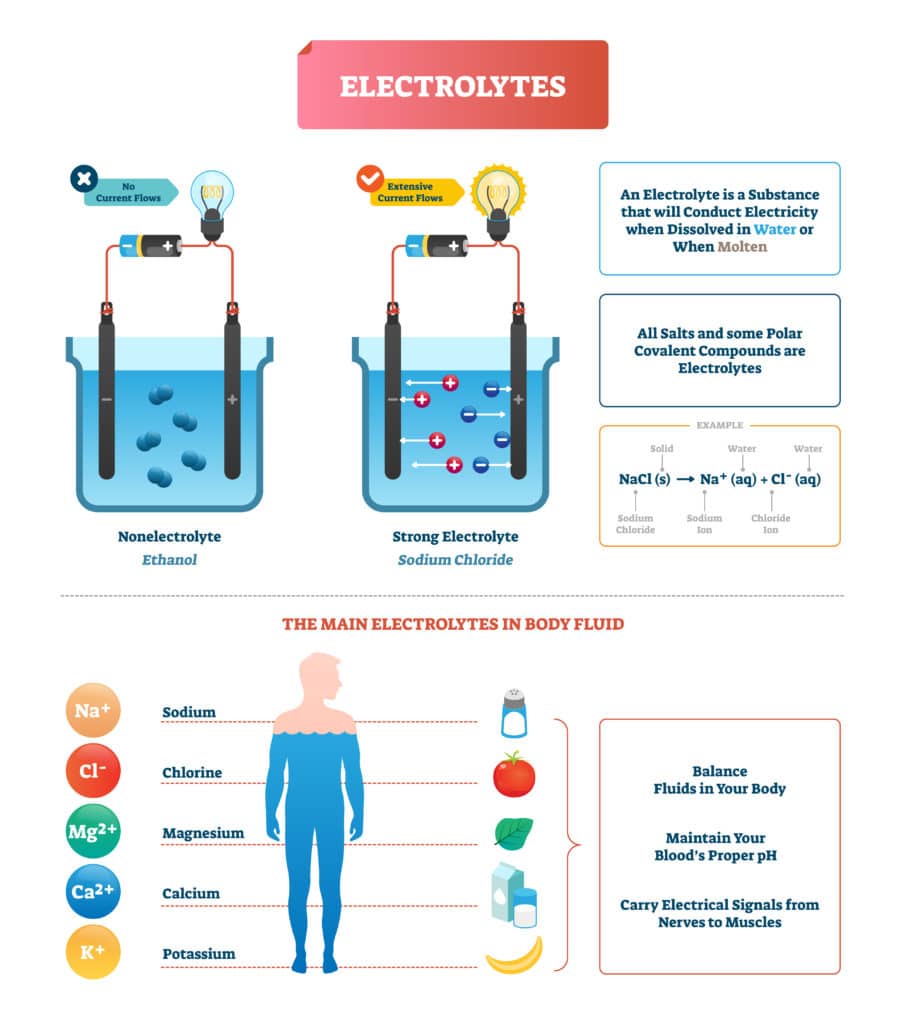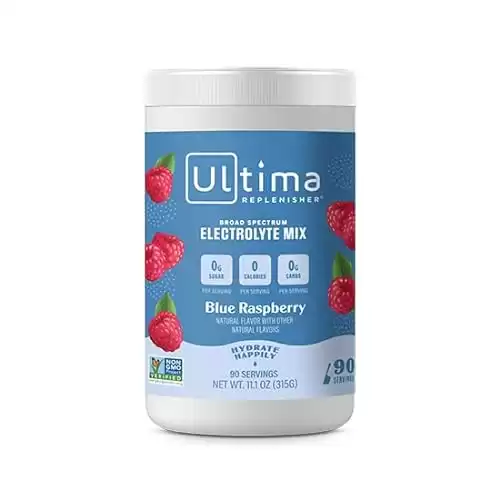What Are Electrolytes & How Does Hydration Affect Your Mental Health?

Did you know that dehydration can have a significant impact on your mental health? Research has shown a clear link between dehydration and mood swings, irritability, and even anxiety and depression.
Drinking enough water and maintaining proper hydration is essential for keeping your mental health in tip-top shape or helping your mood if you’re already struggling. Your brain is composed of 75% water, so it only makes sense that being adequately hydrated is key to optimal brain function.
But what exactly are electrolytes, and how do they play a role in all of this? This article will explore electrolytes and their role in hydration and mental health.
Table of Contents
What Are Electrolytes?
Electrolytes are minerals in your blood and other bodily fluids that carry an electrical charge. They are essential for many processes in the body, including:
- Maintaining proper hydration
- Regulating blood pressure
- Supporting nerve function
- Aiding in muscle contraction
- Helping to balance acidity and pH levels in the body
The four main electrolytes are sodium, potassium, chloride, and magnesium. You get these electrolytes from the foods and fluids you eat.
How Do Electrolytes Affect Hydration?

In terms of hydration, electrolytes play a critical role in directing water and nutrients to the areas of the body where they’re needed most while also maintaining optimal fluid balance inside the cells. In other words, electrolytes help the body better absorb and retain water and regulate fluid levels within the cells.
Electrolytes push water into the cells; if you only drink purified water and do not eat a diet rich in whole foods, you may be dehydrated. You can take an additional electrolyte supplement to help keep you hydrated!
If you suffer from digestive issues that can cause diarrhea, constipation, etc., you are likely dehydrated if you aren’t taking an electrolyte supplement.
Proper hydration is also essential for keeping your electrolytes in balance. When you are dehydrated, your body’s fluids (including blood) become more concentrated, and your electrolyte levels increase. And when you’re overhydrated, your body’s fluids dilute, and your electrolyte levels decrease.
Either way, an imbalance in electrolytes can seriously affect your health. For example, dehydration can lead to heat stroke, while overhydration can cause water intoxication. So, you’re better off drinking the right amount of fluids to stay hydrated. More on this later in this post.
How Does Hydration Affect Fatigue, Anxiety, and Overall Mental Health?
Fatigue
One of the most common symptoms of dehydration is fatigue. When dehydrated, your body doesn’t have enough fluids to perform its functions properly. This can lead to exhaustion and make it difficult to concentrate or stay awake.
Also, when you’re dehydrated, your blood volume decreases. As a result, the heart will work harder to pump blood throughout your body, leading to fatigue.
If you’re struggling with fatigue, ensure you drink enough water throughout the day. You might also want to reduce diuretics like caffeine and alcohol, which can dehydrate you.
Anxiety
Dehydration can also cause anxiety. When you’re dehydrated, your body goes into what’s known as “fight or flight” mode. This is the body’s natural response to stress and can cause various symptoms, including anxiety, racing heart, and sweating.
If you’re dehydrated, drink plenty of fluids and rehydrate as soon as possible. Drinking water or electrolyte-rich beverages can help to replenish the fluids and minerals your body needs. You should also not wait until you’re thirsty to drink fluids, as thirst is a sign that you’re already dehydrated.
You may also want to consider adding a magnesium supplement to your routine, as magnesium is helpful for anxiety. This mineral is widely known to help reduce anxiety, mood swings, and stress symptoms, which has earned it the nicknames “the original chill pill” and “nature’s Valium.”
- -How to Learn relaxation techniques you can do anywhere.
- -Identify anxiety in yourself and others.
- -Learn how to better react to situations and set a firm foundation for dealing with stressful situations.
- Use Natural Supplements, Dietary, and Lifestyle changes to help you feel less anxious sooner.
- I am a Counselor in Training, so I share what I learn through my education and experience and the price will go up shortly--- However! You will get all of the free updates I make to the course at no additional charge to you! As I learn through research, my education, and personal experimentation of new supplement regimens I will share them with you!
Mental Health
Dehydration can also affect your overall mental health, which includes your emotional, psychological, and social well-being. Without adequate water, the brain won’t have enough fluids to function correctly, leading to problems with concentration, memory, and decision-making.
One study found mild dehydration can cause attention, memory, and motor skills problems. The study participants also had higher levels of the stress hormone cortisol.
Dehydration can also worsen symptoms of mental health conditions like anxiety and depression. If you or anyone you know is struggling with mental health, ensure they’re staying hydrated. That’s a simple remedy that can help to improve symptoms.
Tips for Staying Hydrated
- Drink plenty of fluids throughout the day. Aim for eight 8-ounce glasses of water per day.
- Drink more when sweating, such as during exercise or in hot weather.
- Drink before, during, and after exercise.
- Avoid diuretics like caffeine and alcohol, which can dehydrate you.
- Don’t wait until you’re thirsty to drink fluids. Thirst is a sign that you’re already dehydrated.
- Add a magnesium supplement to your routine, as magnesium is helpful for anxiety.
- Eat foods rich in minerals such as Himalayan salt
How Much Water Should I Drink?
The amount of water you need to drink varies depending on several factors, including your age, activity level, and climate. The American Academy of Pediatrics recommends that children and teens drink at least six to eight cups of water per day.
For adults, the Institute of Medicine recommends women drink at least nine cups of water per day, and men drink at least 13 cups. These recommendations may need to be increased in hot weather or during periods of intense exercise.
Pay attention to your urine color if you’re not sure you’re drinking enough water. If it’s pale yellow or clear, you’re well-hydrated. You need to drink more fluids if it’s dark yellow or orange.
You should also be aware of the signs and symptoms of dehydration, which include:
- Thirst
- Dry mouth
- Fatigue or tiredness
- Headache
- Constipation
- Dizziness
If you’re experiencing any of these symptoms, drink fluids immediately and seek medical attention if the symptoms are severe. Dehydration can be dangerous, especially for young children and older adults.
Bottom Line
Electrolytes are minerals that play an important role in hydration and keeping the body functioning correctly. Dehydration can cause fatigue, headaches, anxiety, and depression.
To stay hydrated, drink at least eight glasses of water per day (for adults) or more if you’re sweating or in hot weather. Also, remember not to overhydrate, as this can be dangerous. And talk to your doctor if you’re struggling to stay hydrated or if you have any concerns about your electrolyte levels.
Originally posted 2022-10-02 18:46:56.
Megan Santiago
Latest posts by Megan Santiago (see all)
- How to Find a Trauma Therapist in Tampa - September 30, 2024
- The Best List of Jobs for People With Social Anxiety! - March 10, 2024
- Relaxation Techniques for Anxiety, Depression & Mental Clarity - March 10, 2024


